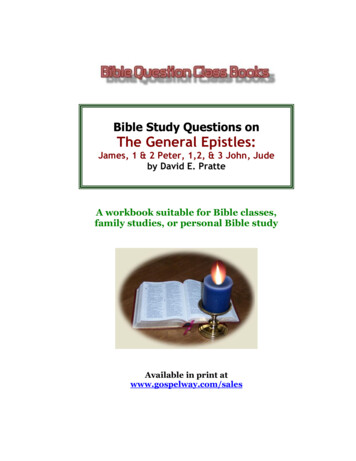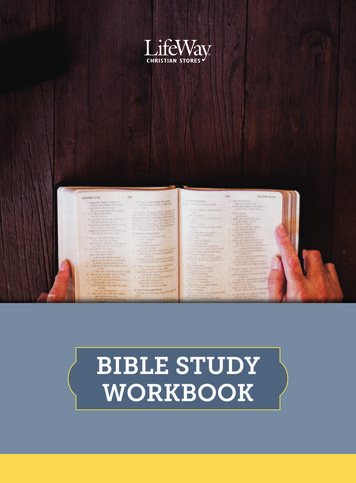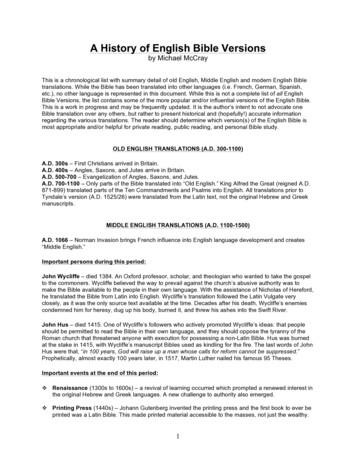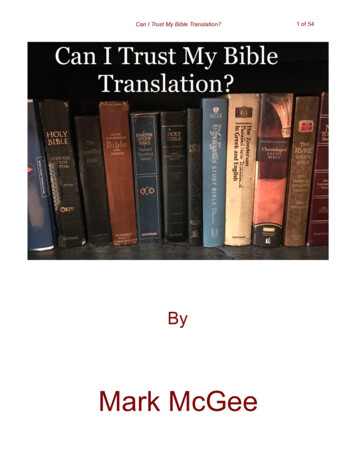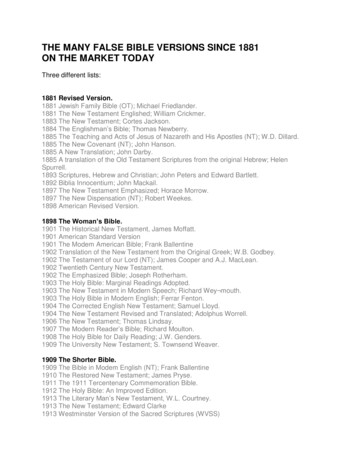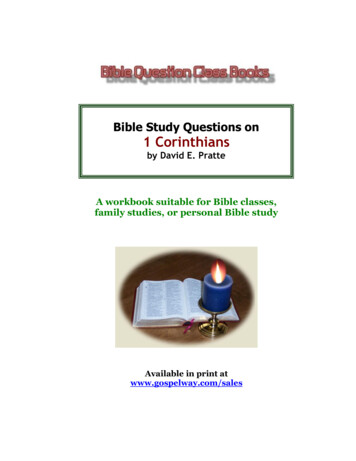
Transcription
Bible Study Questions on1 Corinthiansby David E. PratteA workbook suitable for Bible classes,family studies, or personal Bible studyAvailable in print atwww.gospelway.com/sales
Bible Study Questions on the Book of 1 Corinthians:A workbook suitable for Bible classes, family studies,or personal Bible study Copyright David E. Pratte, 2013, 2014Minor revisions, 2016All rights reservedISBN-13: 978-1496125040ISBN-10: 1496125045Printed books, booklets, and tracts available atwww.gospelway.com/salesFree Bible study articles online atwww.gospelway.comFree Bible courses online atwww.biblestudylessons.comFree class books atwww.biblestudylessons.com/classbooksFree commentaries on Bible books atwww.gospelway.com/commentaryContact the author atwww.gospelway.com/commentsNote carefully: No teaching in any of our materials is intended or should ever beconstrued to justify or to in any way incite or encourage personal vengeance orphysical violence against any person.“He who glories, let him glory in the Lord”– 1 Corinthians 1:31Front-page photoRuins of the bema or judgment seat in Corinth. It is virtually certain that the apostle Paul stoodbefore the Roman proconsul Gallio in this very place.“Now when Gallio was proconsul of Achaia, the Jews with one accord rose up against Paul andbrought him before the judgment seat.” – Acts 18:12.Photo credit: Ploync distributed under Creative Commons free distribution license, viaWikimedia CommonsScripture quotations are generally from the New King James Version (NKJV), copyright 1982,1988 by Thomas Nelson, Inc. used by permission. All rights reserved.Workbook on 1 CorinthiansPage #2
Other Books by the AuthorTopical Bible StudiesGrowing a Godly Marriage & Raising Godly ChildrenWhy Believe in God, Jesus, and the Bible? (evidences)The God of the Bible (study of the Father, Son, and Holy Spirit)Grace, Faith, and Obedience: The Gospel or Calvinism?Kingdom of Christ: Future Millennium or Present Spiritual Reign?Do Not Sin Against the Child: Abortion, Unborn Life, & the BibleTrue Words of God: Bible Inspiration and PreservationCommentaries on Bible BooksGenesisJoshua and RuthJudges1 SamuelEzra, Nehemiah, and EstherJobProverbsGospel of MarkGospel of JohnActsRomansEphesiansPhilippians and ColossiansHebrews1 & 2 PeterBible Question Class BooksGenesisJoshua and RuthJudges1 SamuelEzra, Nehemiah, and EstherJobProverbsEcclesiastesIsaiahGospel of MatthewGospel of MarkGospel of LukeGospel of JohnActsRomans1 Corinthians2 Corinthians and GalatiansEphesians and PhilippiansColossians, 1&2 Thessalonians1 & 2 Timothy, Titus, PhilemonHebrewsGeneral Epistles (James - Jude)RevelationWorkbooks with Study NotesJesus Is Lord: Workbook on the Fundamentals of the Gospel of ChristFollowing Jesus: Workbook on DiscipleshipGod’s Eternal Purpose in Christ: Workbook on the Theme of the BibleVisit our website at www.gospelway.com/sales to see a current listof books in print.Page #3Workbook on 1 Corinthians
Bible Study Questions on 1 CorinthiansIntroduction:This workbook was designed for Bible class study, family study, or personal study. The classbook is suitable for teens and up. The questions contain minimal human commentary, but insteadurge students to study to understand Scripture.Enough questions are included for teachers to assign as many questions as they want for eachstudy session. Studies may proceed at whatever speed and depth will best accomplish the needsof the students.Questions labeled "think" are intended to encourage students to apply what they have learned.When questions refer to a map, students should consult maps in a Bible dictionary or similarreference work or in the back of their Bibles. (Note: My abbreviation "b/c/v" means "book,chapter, and verse.")For class instruction, I urge teachers to assign the questions as homework so students cometo class prepared. Then let class time consist of discussion that focuses on the Scripturesthemselves. Let the teacher use other Scriptures, questions, applications, and comments topromote productive discussion, not just reading the questions to see whether they were answered“correctly.” Please, do not let the class period consist primarily of the following: "Joe, will youanswer number 1?” “Sue, what about number 2?" Etc.I also urge students to emphasize the Bible teaching. Please, do not become bogged downover "What did the author mean by question #5?" My meaning is relatively unimportant. The issueis what the Bible says. Concentrate on the meaning and applications of Scripture. If a questionhelps promote Bible understanding, stay with it. If it becomes unproductive, move on.The questions are not intended just to help students understand the Scriptures. They are alsodesigned to help students learn good principles of Bible study. Good Bible study requires definingthe meaning of keywords, studying parallel passages, explaining the meaning of the text clearly,making applications, and defending the truth as well as exposing religious error. I have includedquestions to encourage students to practice all these study principles.Finally, I encourage plain applications of the principles studied. God's word is written so soulsmay please God and have eternal life. Please study it with the respect and devotion it deserves!For whatever good this material achieves, to God be the glory.You can find Bible study commentary and notes to accompany these questions atwww.gospelway.com/sales David E. Pratte, June 21, 2017Workbooks, commentaries, and topical studies for sale in print atwww.gospelway.com/salesTo join our mailing list to be informed of new books or special sales, contact theauthor at www.gospelway.com/commentsWorkbook on 1 CorinthiansPage #4
Questions on 1 Corinthians 1Read 1 Corinthians 1 then answer these questions:1. List 4 facts about the author of this book – 1:1. (Think: Who was Sosthenes?)2. Special Assignment: Describe Corinth (check Bible dictionaries, etc.). Locate Corinthon a map and explain how its location affected the character of the city.3. List 4 facts about the church at Corinth.4. Skim the book and state briefly what it is about.5. Define “sanctified” and “saint” – 1:26. According to 1:5-7, how had God enriched this church? What are “utterance andknowledge”? (Compare chap. 12-14.)7. Give b/c/v showing how Jesus’ testimony was confirmed.8. What “gifts” did Corinth have (think)?9. What did the Corinthians do regarding Jesus’ revelation, and what help was God givingthem – 1:8?10. Define “faithful” (1:9) and tell why this quality of God is important.11. Case Study: Some folks think local church “fellowship” includes coffee and donuts, funand games, recreation and meals. Discuss whether Biblical fellowship is physical or spiritual.Page #5Workbook on 1 Corinthians
12. What problem at Corinth is discussed in 1:10-4:21?13. List & define 4 expressions in 1:10 that describe unity or division.14. List 3 other passages outside 1 Cor. that discuss unity or division.15. What are “contentions” (1:11), and who reported them to Paul?16. What was the nature of the division – 1:12? (Think: Were these preachers responsible forthe division? Explain.)17. Case Study: List ways people sometimes exalt religious leaders.18. Answer the questions in 1:13. What is the significance of each one?19. Application: What applications should people today make from vv 10-13?20. Whom had Paul baptized in Corinth – 1:14-16?21. Why was Paul glad he had not baptized more (consider context)?22. Do household baptisms prove infant baptism (v16)? Explain.Workbook on 1 CorinthiansPage #6
23. Special Assignment: Prove what Paul taught about whether or not baptism is essentialto forgiveness of sins.24. Does it matter who performs a baptism (cf. John 4:1,2)? Explain.25. Harmonize 1:17 with other Bible teaching about baptism.26. Define “wisdom” and “foolishness.” (Think: What different kinds of wisdom arediscussed in vv 17-25?)27. What is “the word of the cross”? How do different people view it – 1:18?28. How can human wisdom make the cross void – 1:17?29. Define “scribe” and “disputer.” What happened to these people according to 1:19,20?(Think: Explain how this may happen.)30. Case Study: Give examples of “wise” men that do not know God – 1:21.31. How is God’s wisdom made known?32. Define “sign.” Give examples of Jews seeking signs and Greeks seeking wisdom – 1:22.(Think: Was it wrong to seek signs? Explain.)33. How was Jesus viewed by Jews, Greeks, & the called – 1:23,24? Why?Page #7Workbook on 1 Corinthians
34. How can God be “foolish” or “weak”? Explain 1:25.35. Why did God choose a plan that many would reject – 1:26-29? How does this reveal Hiswisdom?36. From what classes of people are not many called? Who is included in these groups? (Think:How is the word “calling” used here?)37. Does this mean no one in these classes will be saved? Explain.38. In what sense are the things God chose “foolish,” “weak,” “despised,” etc.? (Think: Whatis meant by “things that are not”?)39. Give some of examples of “foolish,” “weak,” “despised” things.40. Explain in your own words the point of 1:26-28.41. What is God’s reason for doing all this – 1:29? Where else in chaps. 1-4 is this point made?What was the application to Corinth?42. Special Assignment: Name other examples in which God chose plans so man could notglory? (Think: Does this prove there is nothing for man to do?)43. What 4 things did Christ become – 1:30? Define each and explain the point.44. What conclusion did Paul reach in 1:31?Workbook on 1 CorinthiansPage #8
Questions on 1 Corinthians 2Read 1 Corinthians 2 then answer these questions:1. What did Paul not emphasize in his teaching, and what did he emphasize – 2:1,2? (Think:Where else had he mentioned this?)2. What problems did Paul have among them – 2:3? Explain.3. What kind of wisdom did Paul not emphasize, and why not – 2:4,5?4. What kind of power and wisdom did he emphasize, and why – 2:6,7? (Think: Where elsehas he made a similar contrast? What is the point of the word “perfect” in v6, KJV?)5. Who did not recognize this wisdom – 2:8?6. Define “mystery.” What other verses say the gospel is a mystery? (Think: In what sense isthe gospel a mystery?)7. What did the rulers do because of ignorance?8. What passage is quoted in 2:9? Explain what it says. (Think: Do the “things” here refer toheaven? Cf. vv 8,10. Explain.)Page #9Workbook on 1 Corinthians
9. Who has revealed these unknown things, and how does He know them – 2:10? (Think:Connect this to the idea of a “mystery” in v7.)10. Special Assignment: List 2 other passages about the Holy Spirit’s work in revealingGod’s will to man.11. Define “reveal.” Explain the comparison of 2:11. (Think: What application can this haveto mind readers and psychics?)12. List the steps in the process of revelation from God to man – 2:10-13.13. Did human wisdom reveal God’s will? Why is this important?14. Case Study: Some folks claim the Spirit revealed ideas but let the writers express thoseideas by their own wisdom. What does the Bible teach about this? Why does it matter?15. What do “natural” and “spiritual” mean in 2:14,15? (Hint: In the context of chaps. 1-3, whothinks God’s word is “foolishness”?)16. How does a “spiritual” man make judgments – 2:14-16? (Think: In what sense is such aman not judged?)17. In what sense have people known or not known the Lord’s mind?Workbook on 1 CorinthiansPage #10
Questions on 1 Corinthians 3Read 1 Corinthians 3 then answer these questions:1. Define “carnal,” and tell how it is used in 3:1-3.2. Explain the illustration of babies and milk (vv 1,2). (Think: Where else is this illustrationused in Scripture?)3. What proved that the Corinthians were carnal – 3:4?4. Define “jealousy” (“envy”) and tell how it was manifested in Corinth.5. Special Assignment: Describe examples showing how jealousy among preacherssometimes creates problems.6. Whom did Paul say he and Apollos were (3:5), and what is his point?7. Explain the phrase “by whom ye believed.” (Think: What had the Lord “given” to them, andwhat lessons should we learn?)8. To what are preachers compared in 3:6,7? Where are similar illustrations used?9. Case Study: How can this illustration help us if our teaching leads to many converts?What if few are converted?10. What relationship should the planter and waterer have (3:8), and what should that teachthe Corinthians?Page #11Workbook on 1 Corinthians
11. What is God’s relationship to teachers – 3:9? (Think: What blessings does this imply?)12. What is God’s relationship to the church (v9)? (Think: Explain these illustrations.)13. What does Paul compare himself to in 3:10, and what work did he do? (Think: How hadhe earlier illustrated this point?)14. What foundation must we build on – 3:11?15. Case Study: Is the church built on Peter or a man? Explain.16. What is meant by the materials listed in 3:12 (keep it in context!)?17. What will reveal the nature of these materials – 3:13? (Think: What is meant by fire?)18. What happens to the builder if the materials survive or if they are burned up – 3:14,15?(Think: Do these verses teach purgatory?)19. Case Study: A friend says these verses prove “once saved, always saved.” How would youanswer him?20. Explain vv 14,15. (Think: How does this comfort teachers?)Workbook on 1 CorinthiansPage #12
21. List Scriptures showing the Holy Spirit is in us – 3:16,17.22. Does this indwelling prove we can have miracles today? Proof?23. List Scriptures showing the Father or Son is in us, we in them, or they in one another.(Think: What does indwelling mean in these cases? Study John 17:20-23; 2 Cor. 6:14-18.)24. How may one be guilty of destroying the temple? (Think: How does this apply to theCorinthians?)25. Why must one who has worldly wisdom become a fool to be truly wise – 3:18 (keep it incontext of chap. 1-4)?26. Special Assignment: Summarize how God views worldly wisdom.27. What passages are quoted in 3:19,20 to prove this?28. In whom should we not glory or boast – 3:21? Where was this earlier stated?29. What belongs to the Corinthians – 3:21,22? (Think: What is the point?)30. In what sense do we belong to Christ – 3:23? (Think: In what sense does Christ belong toGod?)Page #13Workbook on 1 Corinthians
Questions on 1 Corinthians 4Read 1 Corinthians 4 then answer these questions:1. Define “steward” – 4:1. In what sense are preachers stewards?2. List two other passages about stewards.3. What is the main requirement of stewards – 4:2? Explain.4. Give examples of ways stewards may be unfaithful.5. Who judges a steward – 4:3,4? Whose judgment of him matters little?6. Case Study: A friend says we should not tell people they are wrong because we should not“judge.” How would you answer?7. When will we be judged? What advantages will the judge have – 4:5?8. What does it mean to act or think beyond what is written – 4:6? In what way was Corinthguilty of this? (Think: What did Paul mean by transferring this to himself and Apollos?)9. What is the source of the things we have received – 4:7? What does this prove about pride?(Think: How does this apply to preachers?)10. What 3 characteristics does 4:8 say the Corinthians had? (Think: Were they really like thisor did they just think so? Explain.)Workbook on 1 CorinthiansPage #14
11. Why did Paul want them to reign? (Think: In what sense?)12. What position do apostles have according to 4:9?13. In what sense were apostles a spectacle?14. Describe the advantages of the Corinthians and the disadvantages of the apostles – 4:10.(Think: Is this really true? Explain.)15. What problems did the apostles have – 4:11?16. How did they act when mistreated – 4:12,13? (Think: What Scriptures show this is properconduct?)17. How did Paul conclude his description in 4:13? Explain.18. What is the point of all these descriptions and comparisons – 4:14?19. How does Paul use the word “father” in 4:15? (Think: Where else are words such as “child”or “son” used similarly?)20. Special Assignment: What does the Bible teach about calling priests or preachers“father”?Page #15Workbook on 1 Corinthians
21. How do you explain 1 Cor. 4:15? (Note the “10,000 tutors.”)22. What does 4:16 instruct Christians to do?23. Special Assignment: List other passages about following the example of inspiredmen. Discuss the purpose of apostolic examples.24. Whom had Paul sent to them? Why – 4:17? (Think: What else do we know of him?)25. Do different churches have the right to teach different doctrines (v17)? Explain theconsequences of this.26. What attitude did some have toward Paul – 4:18?27. What did Paul intend to do about it – 4:19?28. Explain 4:20, and give some applications.29. What alternatives did Paul offer in 4:21? Explain them. (Think: How is our treatment ofothers determined by their conduct?)Workbook on 1 CorinthiansPage #16
Questions on 1 Corinthians 5Read 1 Corinthians 5 then answer these questions:1. What specific sin existed at Corinth – 5:1? (Think: What is the point of saying Gentiles wouldnot be guilty of this?)2. Special Assignment: Define fornication. List passages about it.3. What attitude did the church have about this, and what attitude should they have had –5:2?4. What should have been done to the guilty man (v2)?5. Special Assignment: As we proceed, make a list of the expressions used to describe theaction the church should take.6. What had Paul done though he was not at Corinth – 5:3?7. What does 5:4 tell about how church discipline should be exercised?8. What should be done to the sinner (5:5), and where else is this expression used? (Think:Explain “deliver him to Satan.”)9. What purpose is given for discipline in v5? (Think: In what sense is the flesh destroyed?)10. Explain the illustration of leaven and lump – 5:6-8.Page #17Workbook on 1 Corinthians
11. List other passages about the danger of harmful influence and the need to avoid it.(Think: What lessons should Corinth learn?)12. What should be done to “leaven” in a congregation? (Think: Give other illustrationsshowing the value of removing bad influence.)13. Explain the sense in which Christ is our Passover.14. What “leaven” should be removed (v8)? Define these terms.15. Case Study: Suppose a member says the only purpose for church discipline is to restorethe sinful member. How would you answer?16. Instead of leaven, what should we have?17 What had Paul written to the Corinthians previously – 5:9?18. Define “world” and “brother” in 5:10-13. What is the application to church discipline?19. List and define each sin in vv 10,11. Give other passages where they are used.Workbook on 1 CorinthiansPage #18
20. Explain how these people should be treated according to 5:11.21. Define “judge” as used here – 5:12 (cf. v3). Explain the sense in which the church mustmake a judgment.22. Distinguish whom we judge from those whom God judges – 5:13.23. What should be done to the wicked man (v13)?24. Define “wicked.” List Old Testament passages where similar language is used. (Think:At what point is a person “put away from among us”? When he just quits attending? Cf. vv2,7,11,13.)25. Special Assignment: List other passages regarding church chastisement of sinners.Summarize what these passages (including 1 Cor. 5) say should be done regarding sinners inthe church. Summarize the kinds of sins that should be chastised. Summarize the purposesto be accomplished by church discipline.26. Study 2 Cor. 2:4-11 & 7:5-13 and tell what happened as a result of Paul’s instructions. Whatelse can we learn from these passages?27. Case Study: May the church withdraw only when people commit immorality like 1 Cor.5:11, or is this a principle applying to sin in general? Prove which is right.Page #19Workbook on 1 Corinthians
Questions on 1 Corinthians 6Read 1 Corinthians 6: then answer these questions:1. Describe the problem Paul discusses in – 6:1-8. Note v6.2. Special Assignment: List other passages about how Christians should deal withaccusations of sin between brethren.3. What will Christians do according to vv 2,3, and what is Paul’s point? (Think: In what sensewill Christians do this?)4. Explain 6:4. Note: the last part can be a question (NKJV) or a statement (KJV).5. Who should be able to decide between brethren – 6:5? (Think: Then is v4 instructing us toset the “least esteemed” to be judges?)6. Considering all the above, summarize what a brother should do instead of taking abrother to court. (Think: Why are Christians better judges than civil rulers?)7. What does v7 say we should be willing to do, if necessary? (Think: In what circumstancesmight this be necessary?)8. Instead of suffering wrong, what had the Corinthians been doing – 6:8?9. Case Study: What should a Christian do if he has been wronged by one who is not aChristian? Cite Scriptural examples.Workbook on 1 CorinthiansPage #20
10. What consequences will unrighteous people suffer – 6:9? Explain. (Think: List similarpassages elsewhere.)11. Who else has previously been called “unrighteous” (or “unjust”)? (Think: What is theconnection between vv 9-11 and the context?)12. List people who will not inherit the kingdom of God – 6:9,10. (Think: Compare to 5:11.)13. Define each of the following terms and give other Scriptures regarding each one:“adulterer”“effeminate” and “abusers of themselves with mankind” (KJV)“thief.”14. Case Study: If a church is considering accepting homosexuals, what passages shouldthey consider?15. What application did this discussion have at Corinth – 6:11? (Think: What does this showabout conditions in Corinth?)16. Define “sanctified” & “justified.” What solves the problem of sin?17. Case Study: Suppose a homosexual (or alcoholic) says he was born this way and cannotchange. How should he be answered?Page #21Workbook on 1 Corinthians
18. State the theme of 6:12-20. How does it relate to the context?19. Explain in what sense “all things are lawful” – 6:12. Absolutely? (Think: Could Paul bestating an argument used to defend fornication?)20. List and explain two responses Paul gives to the idea all things are lawful – 6:12,13. Define“expedient.”21. Explain “Meats for the belly and the belly for meats.” (Think: Is this another argumentPaul is responding to?)22. Who ultimately controls the body and the meat? What applications can be made tofornication?23. What is the body for, and what will God do to the body – 6:13,14?24. Special Assignment: List other passages that show what our bodies should be usedfor.25. In what sense are our bodies members of Christ – 6:15? (Think: Is the body unimportantbecause it is physical? Explain.)26. What passage is quoted in 6:16, and what does it teach?Workbook on 1 CorinthiansPage #22
27. What is the application of 6:15,16 to fornication?28. What relationship do we have with the Lord according to 6:17? (Think: Explain how thisrelates to the discussion of fornication.)29. How should we handle fornication – 6:18? Explain.30. What is the connection between fornication and the body? (Think: In what sense are othersins without the body?)31. What is the connection between the Holy Spirit and the body – 6:19,20? Give similarpassages. (Think: Explain what this means.)32. What else do vv 19,20 teach about our bodies? Give parallel verses.33. What price was paid for our bodies? How can they glorify God?34. How does this apply to fornication? Give other applications.Page #23Workbook on 1 Corinthians
Questions on 1 Corinthians 7Read 1 Corinthians 7 then answer these questions:1. What subject is discussed in chap. 7? Why did Paul write about it?2. Does the Bible describe marriage as good or bad – 7:1? Give b/c/v. (Think: Why does Pauldiscourage it? Study context, esp. v26.)3. Why might one choose to marry according to 7:2?4. Special Assignment: List purposes the Bible gives for marriage.5. What should husband and wife do for one another – 7:3? Explain.6. What reason is given why husband and wife should give what is due – 7:4? (Think: Whatdoes this mean, and what conclusions follow?)7. Under what conditions may a couple refrain – 7:5? What is the reason for this rule? (Think:Describe practices that violate this rule.)8. Case Study: Many people live together in “trial marriages” to see if they are compatible.How would this and other passages apply?9. How do vv 2-5 emphasize the beauty of the marital relationship?10. How does speaking by permission differ from commands – 7:6? (Think: To what versesdoes this statement refer?)Workbook on 1 CorinthiansPage #24
11. What advice does Paul give in 7:7? (Think: Why say this? Cf. vv 1,8.)12. Must all men follow this advice? Why or why not?13. What advice is given to unmarried people in 7:8? (Cf. vv 1,7.)14. Yet what option is available to them, and why is this option acceptable – 7:9?15. Whom does Paul address in 7:10? Is this just Paul’s advice?16. What command does he give? (Think: What does “depart” mean here? Check othertranslations, and note “unmarried” in v11.)17. Special Assignment: List and summarize other passages about divorce andremarriage.18. What options are available if a man or woman has departed – 7:11? (Think: Is divorcewrong of itself or only remarriage?)19. Case Study: Suppose a sinner divorces, not for fornication, and remarries, then wantsto be baptized. May he stay with his wife? Proof?20. What marriage situation is discussed in 7:12-16? (Think: What is meant by “I, not theLord” in v12?)Page #25Workbook on 1 Corinthians
21. What should a Christian do if the unbeliever wants to remain – 7:12-14? What reason doesv14 give for this?22. Define “sanctify” & “unclean.” How do the children relate to this? (Think: Why mightCorinth have been concerned about this?)23. If the unbeliever departs, what should the Christian do – 7:15? (Think: Does this apply ifa Christian leaves a Christian spouse?)24. Does v15 mean the Christian may remarry? (Consider: vv 10,11 and other verses. Is“bondage” the same as “bound” in vv 27,39, or does “bondage” mean slavery?)25. What reason does Paul give in 7:16 for this instruction?26. State the theme or main point of 7:17-24. What question concerns Paul here, and how doesthis relate to vv 12-16?27. What circumstance is discussed in 7:18,19? Why does one not need to change thiscircumstance? Explain the connection to vv 17-24.28. What does this prove regarding our relationship to the Old law?29. Case Study: Does this passage teach that a person may continue in sinful practices orrelationships? Explain (see v19). Give examples.30. How does 7:21 illustrate the principle being taught in context? Which alternative ispreferred? Why?Workbook on 1 CorinthiansPage #26
31. Explain 7:22. How can one be both free and a slave?32. Name other situations that illustrate the principle of vv 17-24.33. How do these points relate to marriage in the context?34. Does 7:25ff contain Divine command or inspired advice?35. Under what circumstances did these ideas apply – 7:26?36. What advice does Paul give in 7:27? Relate this to vv 17-24.37. What does Paul say about one who chooses to marry – 7:28? (Think: Define “loosed.” Areall “loosed” people free to marry?)38. Why does he advise them not to marry – 7:28?39. Explain how those who have wives would be as those who do not – 7:29. (Think: In whatsense was the time short?)40. In what sense would those who weep be as if they did not, etc. – 7:30?Page #27Workbook on 1 Corinthians
41. How does 7:31 help explain the point of vv 29,30?42. What happens to the fashion or form of the world? What should we learn?43. What advantage would an unmarried person have – 7:32-34? Explain why this would beso in a time of “distress.”44. Do these disadvantages apply when there is no such distress? What are some advantagesto marriage in “normal” times?45. Case Study: Do these verses justify the Catholic doctrine that forbids church leaders tomarry? Explain.46. What explanation does Paul give in 7:35 for his advice?47. Yet does Paul say it is sinful for virgins to marry – 7:36? (Think: Who gives a virgin inmarriage? What is the “flower of her age”?)48. Explain 7:37,38 in your own words.49. How long are man and woman bound in marriage – 7:39? Give similar passages.50. Under what conditions is one free to remarry, and whom may she marry? (Think: What ismeant by “only in the Lord”?)51. How does Paul conclude his discussion of marriage – 7:40? (Think: Compare to 1 Tim.5:14. Why the difference?)Workbook on 1 CorinthiansPage #28
Questions on 1 Corinthians 8Read 1 Corinthians 8 then answer these questions:1. What subject does Paul introduce in chap. 8? (Think: What was the spiritual significance ofeating sacrifices? Cf. 10:18.)2. How does the effect of knowledge differ from that of love – 8:1? Cf. 13:2.3. Is knowledge bad? Can we be saved by love without knowledge?4. Note 8:2. According to context, what is it that a man may think he knows though he actuallylacks knowledge?5. In what sense is an idol nothing – 8:4?6. Special Assignment: Explain the concept of many gods in heathen idolatry. Explain howthis differs from the true God.7. In what sense are all things “through” or “by” Christ – 8:5,6?8. If an idol is nothing, why would meat offered to it matter?9. Yet what do some people think of meat offered to an idol – 8:7? Why? (Think: Summarizethe problem Paul is wrestling with here.)Page #29Workbook on 1 Corinthians
10. What does 8:8 teach? How does it relate to the context, esp. vv 4-6?11. According to v8, what constitutes a matter of “liberty”?12. Define “stumbling block” – 8:9 How may we cause someone to stumble?13. Special Assignment: List verses about influence or stumbling.14. Describe the application to eating meats – 8:10. (Note carefully the circumstances here.We will note other cases in chap. 10.)15. What happens to the weak brother as a result – 8:11? (Think: Why bring up the fact Christdied for him?)16. What is the consequence to the one who ate the meat – 8:12?17. Case Study: Any time some folks oppose an act, they claim they are offended so you mustquit it. Is that wh
Workbook on 1 Corinthians Page #4 Bible Study Questions on 1 Corinthians Introduction: This workbook was designed for Bible class study, family study, or personal study. The class book is suitable for teens and up. The questions contain minimal human commentary, bu
